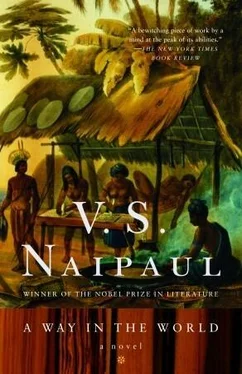“We do things for all kinds of reasons. Some of these reasons can appear quite trivial. And it may be that one of the reasons — just one, perhaps — at the bottom of this venture — so chivalric now, at the limit of the world, so heroic, so doomed to failure, an old man’s nobility — bringing us all here, at the cost of so many lives — it may be that one of the original reasons for this might have been your wish all those years ago to prove that you weren’t a fool, that you hadn’t brought home a cargo of sand as a cargo of gold.
“When you showed the North African gold, people asked why you hadn’t brought back more from this fabled land of El Dorado. Of course you didn’t have the money to buy more. But you say in your Advertisement rather sharply that no one has the right to ask you for more. You go on to say that you didn’t have the time or the tools or the men when you were on the river of El Dorado. The gold had to be hacked away from very hard rock. And people accepted that, though you had prepared for the expedition for years, and had so many men and ships. You had captured the Spanish conquistador who had been on the El Dorado quest and you had picked his brains, and you had gone to look for the mines. It was strange then that, after all of this, you didn’t have the tools, you didn’t have the time. You say the river tide was running so fast you couldn’t stay too long on the banks, and you were far from your ships and you had left them unprotected.
“So all you took back to England was a lot of marcasite sand. I will tell you something else that made the sand business so shameful. Some Frenchmen had done the same thing and had been laughed at. And then, weeks before you, a young English nobleman had done the same thing too. Sir Robert Dudley, the Earl of Leicester’s son. He had gone to Trinidad. He had asked Indians on the Gulf beach about a gold mine. Just like that. As soon as he arrived. Not knowing the language or anything. And he thought the Indians had made signs to say yes, there was a gold mine just a short way up the beach. They went in full armour and saw the glittering marcasite in the sand. For three days Dudley’s men loaded up with sand. The Spaniards saw, but didn’t trouble them. And then young Dudley left, because you were coming, and he was nervous of being found by you in your El Dorado patch.
“This happened literally just a few weeks before you came to the Gulf, and killed all the Spaniards. While you were exploring the Guiana estuaries Dudley was taking his marcasite back to England. Captain Wyatt wrote up this adventure in very high romantic language. It has been circulated in manuscript. Hakluyt didn’t want to print it. When Dudley was told he had brought back sand, he pretended he had known all along, and had brought the sand back on a whim.
“That was more or less what you said when you went back with your own load of Trinidad sand. You didn’t know about young Dudley’s adventure. You’d found nothing else. Your book doesn’t say you found anything. You had talked to one or two chiefs, that was all. But you had found nothing. In spite of the title of your book, The Discovery of the Large, Rich, and Beautiful Empire of Guiana. A difficult book, not easy to read.
“I think a deliberately difficult book. It’s only here that I understand why the book is so difficult. It’s a deliberate mixture of old-fashioned fantasy and modern truth. Everything you write about this side of the Gulf, the eastern side, the Trinidad side, everything is correct and very clear, every name, every tribe, every little Indian port. Real knowledge, real enquiry. On the river side, it’s a different story. When you get down to the main Orinoco, you write about a strange land of diamond mountains and meadows and deer and birds. It’s beautiful, but only like a painting. The book’s like the work of two different men.
“I think that when you began to travel in Guiana up that river, when you saw what a foolish old man the old Spanish conquistador was, when you saw the poverty of the tribes, you knew that there was no El Dorado. And you hated travelling on the river. I can understand from your writing how hard that kind of travel is. The sun, the airlessness, the constant running aground, the excrement and the food and the cooking all mixed up on the galley, people getting wet and dry and then wet again, the smell of many sweaty men in a small space.
“You were differently dieted, you said. However much you wanted to be like Hawkins or Drake, you couldn’t do the kind of thing they had done. You never wanted to get too far from your ships and your cabin. But you had killed too many people, you had talked too long about El Dorado, and when you went back to England you didn’t want to appear foolish, with the sand. So you had to stick to the El Dorado story.
“Unless you had given up on El Dorado when you were on the river, it doesn’t make sense what you did. You left one man with the Indians to go to the city of gold. One man, in the middle of the forest. The Indian chief asked you to leave fifty men, to protect them against the Spaniards. You said no. You left one man. After all that journey and preparation, all those years of reconnoitring. The man you left was a servant, Captain Gifford’s servant, Francis Sparrow. Francis Sparrow, one of the meaner sort you always rail about, was the man who was going to discover El Dorado for you.
“And to show to people in England where you had been you took the son of the chief Topiawari. You left a boy in exchange. A sixteen-year-old boy, Hugh Goodwin. I don’t know how you could do that. If people had read your book more carefully they would have taxed you with that. Keymis found out the following year what happened to that poor boy. Keymis wrote about it, and we found out from the Spanish reports as well. Before you had even got back into the Gulf that boy had been killed. The Indians told the Spaniards that the boy went out walking in the forest in his English clothes, and a tiger was so maddened by the sight of the clothes that it fell on him and killed him. Sometimes I think it sounds good, sometimes it sounds a mocking Spanish story, sometimes I think it sounds a foolish story. Who knows? Perhaps the Spaniards killed him, perhaps the Indians did. Think of this boy close to tears walking in the forest, in his best clothes, with such goods as he had taken off the ship. Walking in solitude away from the village, after the ships had begun to drift downstream, a hundred miles a day.
“It was harder for Francis Sparrow. He never went looking for El Dorado and the city of Manoa. The Spaniards captured him a few days after you had set him down. The Indians must have informed on him. From the Spanish reports we know he spent seven years in Spanish jails, and you know the terrible things that happen to Protestant people in Spanish jails, even here in the Indies, where the Inquisition also exists.
“You had given up on El Dorado, and after all the hard deaths I think of these two boys left behind in the forest, four hundred miles up river, as special sacrifices of yours. All that we know of them are their names. You never paid too much attention to people like that, the labourers and rowers on the ships.
“And look where it’s brought you back. Look where it’s got us all, waiting in this muddy Gulf for news of your son, and news of your lieutenant Keymis. From time to time during the day the Spaniards in Trinidad will fire off a shot, to let us know they are watching. Just before the sun goes down the Indians will light fires on the shore. Their canoes will paddle by and no one will come to us.
“Yet the day after you arrived you wrote to your wife that you could still be king of the Indies. We will talk about that later. I will come later and give you a second draught, when it’s cool. I have to read and think some more, picking my way through your slippery words. Look how the sun shines through your green silk curtains. They’ve already begun to fade.”
Читать дальше












